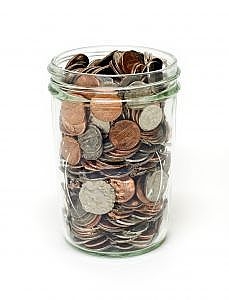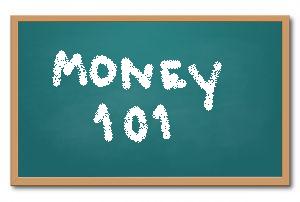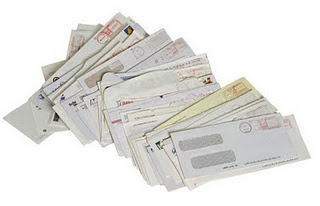I first learned about the Myers-Briggs Type Indicator when I was a graduate student. The MBTI is a series of questions that assigns you a four-letter personality type. There are tons of websites dedicated to explaining the various traits of each type. The MBTI is never 100% perfect as all of us have varying degrees of the other traits, but it tends to be pretty close. (You can take one version of the MBTI here.)
One of the most interesting parts of my training to be a psychotherapist was learning about human behavior. It is so fascinating to look at the things people do and compare those behaviors to the patterns in their families, workplaces, geographic areas, and cultures.
The drawback of learning about human behavior is the tendency to analyze your
own behavior. All the time. Even when you're not trying. Suffice it to say I know myself pretty well, maybe better than I'd like. Despite all the self-awareness I gained through my education, though, I've never thought about how my MBTI personality type might influence my financial decisions.
I have always tested as a strong
INTJ. This stands for
Introverted, i
Ntuitive,
Thinking, and
Judging.
Introverted
While many people hear "introvert" and think "shy," being an introvert actually means I lose energy in a group of people instead of gaining it. I'm far from shy - in fact, I usually don't shut up in a crowd - but it's draining for me to do so. After a large social gathering, I need some time to myself to reflect and recharge. I spend a lot of time thinking about abstract concepts with no real action required. Extroverts, on the other hand, feel awesome and energized after being around a big group of people. They tend to feel pressured to act NOW and think about it later.
How this relates to my finances: I spend a lot of time analyzing what I've done with my money and what I could do better. When I refer to "impulse" buys here on the blog, I rarely mean that I went out and spent money without thinking it out first. Instead, I usually think it over for so long that I convince myself it's the right thing to do. After a purchase, I am prone to over-examining - sitting around wondering if I could have gotten a better deal, if I should have waited, if I should return what I bought. I do the same thing with saving - I am constantly evaluating my savings strategy and tweaking it.
Intuitive
I gain information about the world through intuition. While some people need to touch, see, and hear something to gather facts about it (sensing), I tend to view facts as a way to discern patterns and relationships. This is especially useful for me as a therapist - when someone says, "My husband left me and I'm depressed," I'm looking beyond the factual information she just gave (her husband left, she's sad) to what this reveals about her (she cares very deeply for him).
How this relates to my finances: You won't see a lot of hard facts or strictly informative posts on my blog. Instead of looking at a spreadsheet of numbers, I prefer to determine what the facts are saying and relate them to my own experiences. Okay, so I was over budget last month. What was going on that caused me to spend too much? How does this relate to past overspending? What can I do to prevent this next time? I rely much more on patterns over time than the facts themselves.
Thinking
Depending on when I take the MBTI, I sometimes waver between Thinker and Feeler, though Thinker wins 90% of the time. Thinkers use logic and objectivity to make decisions, while Feelers look more for harmony and the needs of humanity. That doesn't mean Thinkers are unfeeling or Feelers don't think - it just means that, if truth and affirmation are competing against each other, truth will win out for a Thinker and affirmation will win out for a Feeler. For example, if my son asks me if I like his shirt, it's important for me to be honest with him. I'm not mean, but I will totally let him know if he looks silly. My ex-husband, a Feeler, would consider it more important to compliment my son to make him feel good regardless of whether he actually liked the shirt.
How this relates to my finances: If you've read this blog at all, you know I'm no stranger to affirmation. After all, that's what overspending is all about! If I just buy this, own that, and collect these, I'll be happy and fit in - that's what I told myself for years. However, I had to be honest with myself eventually. I knew the chronic spending prevented me from living the life I wanted, so I made changes. My ex, on the other hand, continues the same patterns and probably will his entire life. He will never find his truth because he hides behind the affirmation he gets through spending. (
Confession: I made my final decision to divorce him based on the Myers-Briggs. I was already leaning that way, but as I tried to decide for sure, I came across several research studies that stated our types were the least compatible possible match. Weird? Maybe not, considering what I do for a living.)
Judging
The final letter of my Myers-Briggs type describes how I present myself to the outside world. My preference for Judging means I like a very planned and deliberate lifestyle, as opposed to Perceivers who tend to go with the flow. I can't stand having things up in the air or undecided; I need to know what's coming so I can think about it (introvert), figure out how it fits into everything else in my life (intuition), and make a logical, fair choice (thinking). I love checklists. I like to make decisions and know that things are settled. Perceivers are more likely to sit on a decision until the moment it needs to be made. They are more open to change.
How this relates to my finances: I have worked very hard to bring order to my financial life. Right now, there are about 100 scraps of paper on my desk where I have made lists of bills to pay, calculated various scenarios for earnings from my second job, planned blog posts, written out all my paydays for 2011 to find my magic 3-paycheck months.... You get the idea. Every week, I take all those lists and transfer them to a unified, neatly written list. And yes, I actually do draw checkboxes and check them off as I complete each task. I have a compulsive need to plan ahead so I'll already know what to do when confronted with something that requires a choice.
Do you know your Myers-Briggs type? How does it affect your financial behavior? If you're an INTJ like me, do my traits seem similar to yours?



